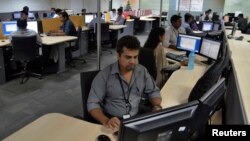The tech industry is bracing itself for an expected Trump administration executive order that will most likely limit U.S. employers’ use of a set of visas for skilled foreign workers.
As a presidential candidate, Donald Trump criticized visa programs that allow U.S. employers to bring skilled foreign workers into the country. He promised to make changes to ensure more of those jobs go to Americans, not foreigners.
The tech industry has relied on temporary visas such as the H-1B to bring in workers with skills it says are hard to find in the U.S. Each April 1, the U.S. holds a lottery for 65,000 of these visas and 20,000 additional visas for foreign students with master’s degrees. Last year, there were requests for more than 200,000, a record figure.
But critics say skilled-worker visa programs have hurt American workers. Companies have used them, they say, to hire foreign workers who are not highly skilled and who are paid lower than market rate wages. The biggest users of the H-1B program have been outsourcing firms that do IT consulting.
Leaked draft order
A draft executive order that has been circulating among tech firms would not immediately impose new requirements. Many of the changes would rely on specific agencies and Congress.
For example, one draft document seen by VOA says the secretary of homeland security will have 90 days to review all regulations allowing foreign workers to come to the U.S., and the Department of Homeland Security shall consider ways that the visas could be better allocated. “It’s vague,” said one person who works for a tech industry group.
But Ron Hira, an associate professor at Howard University and a critic of the foreign worker visa programs, said that the draft executive order he has seen would be a good first step.
“If we got good reform, it would save and create tens of thousands of jobs and it would increase the standard of living for hundreds of thousands of American workers,” he said. “And it would free H-1B visas for the true best and brightest.”
The first place where the effects of the order could be felt will be the annual H-1B application window on April 1. At the moment, the visas are issued by a lottery system, but the Trump administration could choose to favor visas for positions that offer to pay higher wages, Hira said.
Unintended consequences
Some in the tech industry say that some reform has long been needed, but dramatically tightening down on the visas, or restricting U.S. immigration laws, could have unintended consequences.
Jonathan Nelson, chief executive of Hackers/Founders, a tech startup accelerator in San Jose, said he has worried about whether the H-1B visa program has been used to bring in cheap engineering labor, suppressing wages.
But he said most of the entrepreneurs he works with are foreign-born, some waiting for years to get a H-1B or stand in line for a green card. If there are new limits on visas or regulations that lengthen the time workers must wait for one, he said he would open up centers in places such as Vancouver or Guadalajara, Mexico.
“If they can’t come to Silicon Valley, let’s get them in the same time zone,” he said. “I’ll invest in them there instead of here.”
Others in the tech industry argue that barriers to visas, already so scarce, could hurt the U.S.’s competitive edge as an innovation center.
“We should harness the talents of foreign-born entrepreneurs and students to benefit our economy and our communities, rather than pushing them to other countries to compete against us,” said Leezia Dhalla, a spokesperson with FWD.us, an issues advocacy group funded by tech industry leaders that focuses on immigration.




